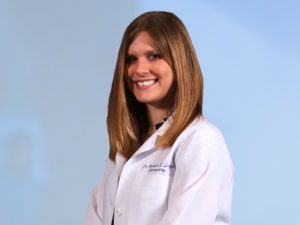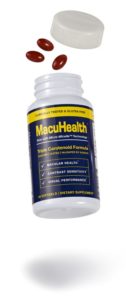

Amanda Legge, OD, of Wyomissing Optometric Center in Wyomissing, Pennsylvania, has long believed that proper nutrition has a positive impact on overall eye health. “AREDS1 is now a 30-year-old study design but proved just how important nutrition is for a specific eye disease. The research on nutrition and eye health has exponentially increased since then. AREDS1 and 2 are not the final answer to eye health supplementation. They are just the start” she says. The more she learns, the more she feels compelled to share that with her patients. “Nutrition is something I’ve often discussed with patients, but now I am getting more specific about how nutrition and supplementation can be important to eye health, cognition and aging well” she says.
Dr. Legge encourages patients to improve their diets first and add supplementation as needed. “Taking a pill but continuing an unhealthy diet is not very helpful. However it is common to eat healthy and still lack the nutrients our bodies need for our best health. That is when I recommend supplementation,” she says.
“I don’t lecture a patient about nutrition. I educate them because I care about maintaining their good vision and health over a lifetime. Patients appreciate this caring approach and are engaged with our conversations”. Just as she asks patients about how well their hypertension or diabetes is controlled, she also asks questions about their diet. “I don’t ask general questions, like ‘Do you eat healthy?’ But I do ask for specifics, such as ‘Tell me what your meals have been for the past two weeks.’ That shows me a pattern,” she says. For example, people routinely confess to “cheating” on their nutrition plan. By discussing diet at each visit. it becomes obvious when someone is just not following their nutrition plan by “cheating” constantly. Maintaining a diet for aging well is a marathon of making conscious, healthful choices over a lifetime.
SIMPLE TEST STARTS CONVERSATION
Dr. Legge has just acquired the LifeMeter, a device she purchased through MacuHealth, a noninvasive device that measures skin carotenoid levels in just a few moments. “Discussing an objective value with a patient, rather than assuming their diet is nutritious enough, is very impactful. The results will either show that their nutrition is good or that there is something lacking, even when a patient thinks they follow a healthy diet.”


While Dr. Legge acquired the device through MacuHealth, she appreciates that it’s not proprietary to any single brand of supplements but opens the door to a broader discussion. When she does make a specific recommendation, she always explains why. “I tell patients that lutein and its sister components zeaxanthin and mesozeaxanthin are pigments found in plants that have high antioxidant properties. These are deposited in our eyes, brain and skin. There is a functional component to these as well, as they improve contrast and glare sensitivity, and researchers are learning more about the protection against cognitive decline. I tell patients that a diet high in carotenoids or supplementation can decrease the risk of dementia and age-related macular degeneration, so this is something that can help for their total health.”
She adds that she tells patients there are no side effects to carotenoid supplementation and there are no interactions with other medications, so the risk/benefit profile makes this an easy recommendation.
MAKE IT CONVENIENT


Another benefit of selling the products in the office is that she gains some clues about a patient’s compliance. If patients purchase an annual supply, she’ll know that. If they opt for stopping in or doing mail order refills every three months, she’ll be able to see whether the patient purchased a full year’s supply. This allows me to discuss barriers to compliance if they are not purchasing the full supply between visits.
EXPANDING PORTFOLIO
At the very end of 2022, Dr. Legge added VitreousHealth to the products she recommends and sells in-office. MacuHealth data shows that the formula has been proven to significantly reduce floaters and enhance visual function. “The feedback from patients has been great. Plus, I really enjoy being able to say, ‘For the first time ever, I have a non-invasive and safe option to try.’”
She has been dispensing a six-month supply, and she is asking patients to return in six months to discuss symptom improvement and reassess the retina and vitreous. Based on the double-blind, placebo-controlled Floater Intervention Study (FLIES), nearly 67 percent of patients recognized an improvement in their symptoms within six months, so she wants to see whether her patients report similar results. “Whenever I add a new test, procedure or product in my practice I like to prove to myself that it clinically works as expected in addition to having the study results”.
DON’T ASSUME PATIENTS KNOW
Too often, doctors assume that patients know more than they do. “Even well-educated patients may not have a full understanding of nutrition,” she says. She recalls a recent conversation with her father. “His PCP diagnosed him with borderline hypertension and hyperglycemia. His doctor recommended he improve his diet, without specific recommendations, and they would re-evaluate in three months. After that follow-up visit, my father called me to tell me his blood pressure and glucose values were worse. Only then did I ask how he changed his diet. He had switched from soda to Gatorade and his primary snacks were now fruit instead of a processed option. “Those are healthier choices, and I understand why he made them, but it wasn’t the right approach for what he needed,” she says.
Discussing diet and the importance of good nutrition is engaging the patient in their total body health. “My goal as their primary eye care doctor is to diagnose and manage disease early. But better than that, discussing preventative care and the importance of a healthy lifestyle may prevent some diseases from occurring in the first place or at least present as a milder form that is easier to manage.” Patients appreciate her attention to their overall health. “Primary care optometry often practices cradle to grave care. I look forward to helping my patients age well as I follow them through my career and their lifetime.”
Read more about LifeMeter here.
Read other stories about ODs who use MacuHealth products in their offices here.



